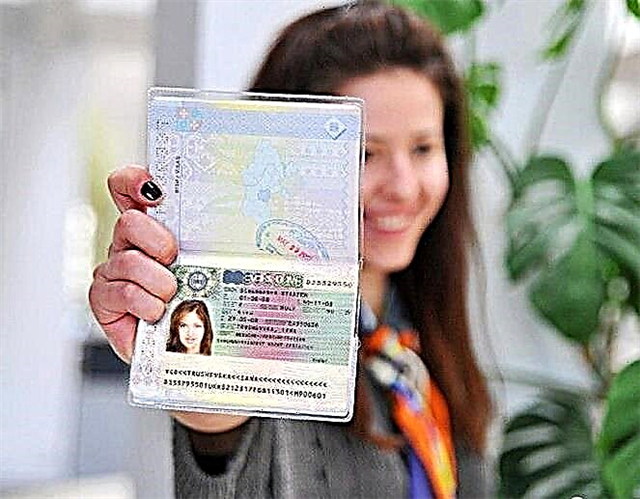According to statistics, the number of fictitious marriages in Russia is growing every year. At the same time, the main part of such relations is formalized between citizens of the Russian Federation and foreigners. Russians are interested in receiving material benefits, since they most often act as a receiving party on a reimbursable basis. Foreigners (primarily labor migrants) strive to facilitate and accelerate the process of their own naturalization.
Registration of a fictitious marriage
In accordance with the definition of the Family Code of the Russian Federation, a fictitious marriage is a marriage concluded between the parties without the intention to create a family. In other words, any such marriage (including one entered into for the subsequent acquisition of Russian citizenship) differs from the actual one in that the spouses' motives for entering into official relations are purely selfish motives.
Benefits for foreigners
The mere fact of entering into such a marriage is not a sufficient reason for immediate entry into Russian citizenship.

However, a foreigner who becomes the spouse of a citizen of the Russian Federation receives legal grounds for:
- Registration of documents required for entering citizenship: permanent registration at the place of residence, as well as a temporary residence permit. In this case, the RWP is issued bypassing the regional quota;
- Official employment and / or business in the Russian Federation. That. a foreigner will be able to receive legal income, which is also a prerequisite for entering citizenship;
- Reducing the naturalization period. In this case, the residency requirement for a foreign spouse is reduced from 5 to 3 years;
- Nominating one's own candidacy as an applicant for obtaining the status of a full citizen of the Russian Federation. At the same time, the deadline for consideration by state bodies of an application for entry into citizenship is reduced from 1 year to 6 months.
Thus, the advantages of such relations for foreigners are due to a significant simplification of the naturalization procedure.
Grounds and mechanism for recognizing the fact of fictitiousness
Most of the marriages in this category are concluded according to the following scheme:
- A citizen of the Russian Federation agrees (in most cases on a reimbursable basis) to register a fictitious relationship with a foreigner (be it a citizen of another state or a stateless person);
- Upon the conclusion of marriage, a foreigner receives the right to naturalization in a simplified manner;
- During marriage, spouses often live separately and do not run a joint household (thereby indirectly violating the norms of the RF IC);
- After deriving mutual benefit (the receiving party receives money, the foreigner takes root in the Russian Federation), the fictitious spouses terminate the official relationship by mutual consent.

The characteristic reasons for suspicion of a particular marriage of fictitiousness (in the context under consideration) are:
You May Also Like
- Multiple marriages of a citizen of the Russian Federation with foreigners over the past years;
- A significant difference in the age of the spouses. Russians of pre- and retirement age often act as the host;
- Immediate filing of an application for a TRP. Often, foreigners send the aforementioned applications after a minimum period of time that has passed since the marriage;
- Indirect violation by spouses of the established norms of the institution of marriage: separation, registration at different addresses, lack of joint property and / or common children for a long time.
If authorized government agencies identify one or more of these signs in relation to a particular married couple, they are entitled to initiate an appropriate check. A similar check can be initiated by ordinary citizens (for example, relatives of a spouse who is a citizen of the Russian Federation) by sending a corresponding application to the court and / or the prosecutor's office.
Directly the check is carried out by employees of the territorial division of the prosecutor's office in the following places:
- Conclusions of a supposedly fictitious marriage (acts of civil status in force in relation to spouses are checked, as well as the legality of their conclusion);
- The life activity of a suspicious couple (first of all, verification is carried out at the places of residence and work of the spouses).
Procedure for recognizing fictitiousness
In case of confirmation of the suspicions that have arisen, the results of the check from the prosecutor's office are forwarded to the court. Upon consideration of the materials received, the court makes an appropriate decision, which is the basis for recognizing the marriage as fictitious (i.e. invalid). After the entry into force of the court decision, the marriage and all its legal consequences are annulled.
The only possible obstacle for the court to make this decision is the birth of a common child in marriage. In such situations, the relationship is recognized as valid regardless of the original motives of the spouses.
Liability and consequences for the parties
Unlike most other developed countries, neither the Criminal Code nor the Code of Administrative Offenses of the Russian Federation provide for direct liability for parties who have entered into a fictitious marriage (including with the aim of simplifying the acquisition of citizenship). This situation becomes even more controversial given that the considered category of relations in the Russian Federation is illegal.
Possible criminal liability
Despite the absence in the current regulatory framework of provisions on direct responsibility for the conclusion of a marriage in order to obtain citizenship, one or both spouses can still become involved in a criminal case.
If a foreign spouse commits any criminal offense on the territory of the Russian Federation, a Russian spouse may be prosecuted as an accomplice in a crime. However, for this, law enforcement officers must have unconditional evidence of his (a citizen of the Russian Federation) awareness of the motives and plans of a foreign spouse. The measure of responsibility depends on the article of the Criminal Code of the Russian Federation, according to which the act committed by a foreigner will be qualified.
In addition, the recognition by the court of the fact of fictitiousness may become a pretext for initiating an investigation under the articles of the Criminal Code establishing responsibility for crimes in the field of migration.
You May Also Like
In particular, a citizen of the Russian Federation can be prosecuted on charges of:
- Illegal Immigration Organizations;
- Fictitious registration and / or registration of a foreigner at the place of residence or stay.
Legal consequences for the parties
Recognition of a marriage as fictitious on the basis of a court decision entails not only dissolution of relations for the former spouses, but also certain legal consequences. In this case, the action of the aforementioned decision covers the entire period of relations. In other words, the marriage (as well as all its consequences) is recognized as null and void from the moment of its conclusion at the registry office.

Thus, in relation to a foreigner:
- A ban is imposed on entering Russian citizenship;
- All rights acquired after the formalization of the relationship are canceled;
- A deportation procedure with a ban on subsequent entry may be applied (in the event that the court is charged with illegal immigration);
- A claim may be filed for compensation for material and / or moral damage (in the event that the former Russian spouse proves his ignorance of the fictitious nature of the marriage).
With regard to both spouses:
- All transactions, the conclusion of which became possible after the parties entered into official relations, are canceled;
- The property jointly acquired during the marriage is divided equally (provided there is evidence of mutual guilt of the parties).
The position of the state bodies of the Russian Federation in relation to the considered category of relations is unambiguous. Any fictitious marriage is nothing more than a fact of fraud, the purpose of which is to extract a certain benefit by one or both spouses. If found, such a marriage union is invalidated and subject to immediate termination.
At the same time, as of the end of 2018, there is no effective unified mechanism for identifying the considered category of fictitious marriages in the Russian Federation. This is due to both the lack of the necessary powers of the migration control authorities and the difficulty of proving the fact of fictitiousness in connection with the purely private nature of any marriage relationship.











